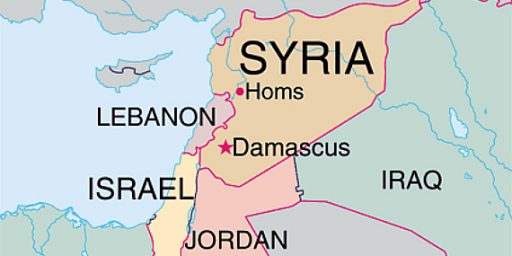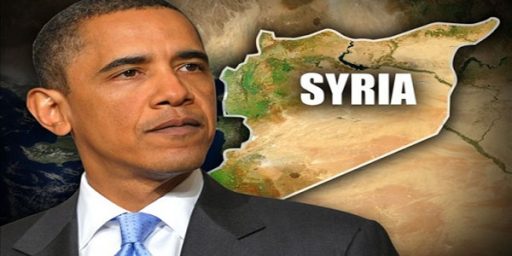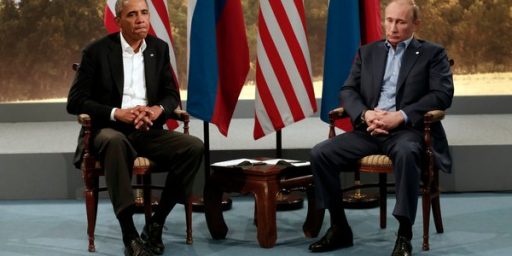Rand Paul’s Odd Dichotomy on Syria
On today’s MTP Senator Paul said the following:
I see Assad, who has protected Christians for a number of decades, and then I see the Islamic rebels on the other side who have been attacking Christians. I see Al Qaeda on one side, the side we would go into support, and I see it to be murky. And I don’t see a clear-cut American interest. I don’t see either party that is victorious, if either party is victorious, being an American ally.
On the one hand, I agree with Senator Paul that we should avoid intervention in Syria and, further, I concur that the situation is murky at best and that regardless of what emerges from the wreckage of the civil war that it is unlikely a clear US ally will be in power.
Having said that, to paint Assad as a defender of Christians in the contrast to Islamic rebels is about a gross an oversimplification as one can make. Or, at least, to make the violence somehow into a Christian v. Islam issue is an incorrect description. And, further, it strikes me as deceptive to make it sounds like only the rebels are adherents to Islam, since the regime is as well. More to the point, the country is fundamentally an Islamic country, riven though it is with internal fissure within the broader Muslim context.
The general make-up of Syria’s ethno-religious divisions are as follows (via Seth Kaplan):
The country’s 19 million people are divided into Sunni Arabs (65 percent), Alawis (12 percent), Christians (10 percent), Kurds (9 percent), Druze (3 percent), Bedouin, Ismailis, Turcomans, Circassians, and Assyrians. This demographic mosaic is further complicated by divisions within many of these groups. The Christians, for example, are divided into eleven main sects, including the Greek Orthodox, Melkite, Syrian, Maronite, Chaldean, Armenian, and Catholic denominations. The Sunni Arabs range from the highly pious to the very secular and are divided between an urban elite and the rural masses that traditionally have had diverging political loyalties. Like many countries in the Middle East, the sharpest divide may not so much be religious or ethnic as it is ideological and existential, pitting Muslims who want to align politics with religion against those who wish to keep them apart. Of all the groups, the Kurds and the Sunni Islamists are the greatest threats to the Syrian state because their political movements have the cohesion, established agendas, outside support, and sense of grievance to drive them to challenge central authority.
As such, the Christian minority is not a key player, nor is Assad motivated by protection of minority groups. I fully understand that Christians in Syria face a grave threat from some Islamist groups, but that doesn’t make the Assad regime pro-Christian.
Quite frankly, Paul sounds like a lot of American politicians who discuss the region, i.e., they really have no idea as to the complexities of ethno-religious conflict in the region. Having said that, I will give Rand credit: even given his seeming scant understanding, it leads him to oppose military adventurism rather than fueling it.
I suppose the thing that I find the most troublesome, beyond just the clear lack of any nuanced understanding of the situation, is that we do not need American politicians trying to reduce any complex foreign policy issue to one of Christians v. Muslims. No good can come from such statements. Paul didn’t have to go there, he could have stuck with the murkiness and the national interest question and come across as more reasonable on the subject.






I don’t think Rand does “reasonable.”
On another note, when I see all the divisions listed, and realize that our own country contains all of those and many more, and yet we have survived as a country for better than two centuries and are still united far more than we are divided, I am proud of my country.
Well, you are completely wrong in this post. Christians suffer much less persecution under secular dictatorships than Islamist governments and Syria is no exception.
well, we saw what happened in egypt – the coptics were singled out just “because” (there was no leadership to squash it). and at the end of the day- muslims killing each other is not really a bad thing as far as we’re considered- they are seemingly bred to hate us and that won’t change for eons at this rate. so sure, drop some missiles on someone over there and just wait for the bad press to start- or more gassing of the civilians.
Nice to see that some commenters are just as clueless as Paul…
@Andy: Did you read the post?
Pleased to Meet you! Glad to know anyone who admires my work!
@Steven L. Taylor: Andy is why Rand Paul says what he says about Syria. He really may not actually know anything about what or who Assad supports and doesn’t support, but as an evangelical, he must say what represents conventional wisdom among that cohort or lose their support. In a state like Kentucky, that support may well be critical to his future in politics (I don’t actually know, but that is what conventional wisdom says about the issue–alas I am guilty of the same sin).
And no, conventional wisdom also tells me that Andy did not read the post, but it really doesn’t matter. He’s not attacking your post; he is asserting his faith position on the matter independently of anything you said.
In a discussion about how to react to use of chemical weapons, Paul introduces Christian versus Non-Christian conflict.
Do chemical weapons work differently on people of differing faith?
Steven, Steven, Steven…. Of course he had to go there, in fact more American politicians need to go there. They aren’t looking for peace in the Middle East, they are looking for good Christian votes and every good Christian knows Jesus won’t come back until the end times are here!
Besides, as Andy and bill so eloquently explained above, every Christian life is worth a thousand Muslim lives.
Are you sure about that?
Seems to me that when Paul is wrong, it’s usually because he’s been lead to the wrong conclusion by his oversimplified views. And when he’s right, it’s usually an accident. There’s a phrase about broken clocks that fits.
@Andy:
Serious question, what countries qualify as Islamist governments now adays?
The ones that immediately spring to mind are:
– Pakistan
– Afghanistan
– Iran
Where else?
As I suggested regarding Ron Paul, Rand Paul has much to compliment as regards his Domestic policies. Their foreign policy, however, is straight guano.
Hilarious…..
A Libertarian non-interventionist suggesting the Government choose up religious sides.
Essentially his position must be something like: I oppose the Government either aiding or attacking any religion, except my religion.
The hypocrisy in the Republican Party is awe inspiring.
@An Interested Party: reality bites! just because the msm isn’t showing the anti-obama/clinton stuff from egypt doesn’t mean it’s not happening. we’re israeli allies and we’re despised throughout the muslim world for that. notice that none of the other arab countries is willing to lob some missiles on them?
so really, them killing each other off is good for us- if/when we step in we just get blamed.
Us? You and that rat in your pocket!
@Steven L. Taylor:
Yes, I read the post. Sorry for the intial brevity, commenting on a phone sucks. Here is a more detailed objection:
First, perhaps it is a simplification, but it is also true. Rights for Christians (and other religions) were protected in the Syrian Constitution. The Assad regime is, no doubt, thugish and brutal, but they are secular and thus protected minority religious practice.
It’s a “Christian v Islam” or, more accurately, a sectarian issue for the people who actually live in the ME and, particularly, in Syria. Should the rebels win you can expect persecution of Christians and other minorities, as has occurred elsewhere in the ME. No one who understand the region doubts this and the historical precedents are plain to see.
No, your comparison is what’s deceptive. There is a massive difference in scale between much of the rebellion and the regime. Lumping both together as “adherents to Islam” is like saying President Obama or GW Bush and the Westboro Baptist Church are all “adherents to Christianity.”
Not a key player? The Alawites are only 12% of the population, are they not a “key player” either? Your statement is at odds with the history of regional minority ruled secular dictatorships in general and Syria and the Assad regime in particular.
Here’s a decent primer on the topic
The rest of your post seems to me to be composed of a lot of questionable assumptions and extrapolation.
@Matt Bernius:
I don’t think there’s a neat line that one can draw, it’s a continuum. On that continuum, the Baathist and secular dictatorships are clustered near one end. Places like Iran and Saudi Arabia are at the other.
@Andy:
Fair. I think some are pretty clearly demarcated. However, the devil is in the details at the fringes. For example are Turkey and Indonesia considered Islamist government?
I think this is ultimately a key part of the issue — whether or not religious and other rights are enshrined in Constitutions or other key founding documents. Admittedly, it’s also important to ensure those rights are enforced as well.
@Matt Bernius:
I’m not that familiar with Indonesia, but Turkey is an interesting case. It’s arguably more islamist than it was due to its current leader who does not subscribe to the idea of a secular state in the way is predecessors did.
Like other places in the ME, there is a struggle over the nation’s identity and the role Islam should play in that identity. Erdogan may be the beginning of a trend toward increased Islamicization in Turkey – we’ll have to wait and see.
To your earlier point, I think we need to differentiate between governments with Islam enshrined as a state religion, and those countries, like Turkey, whose constitution is secular (or leans secular) but currently has a ruling party that has Islamist leanings. It seems to me that these are two entirely different things, until such time as the constitution is successfully rewritten by the ruling party.
@Andy:
Andy, that PBS article was pretty good, but I’d like to embellish it a bit.
The Syrian and Turkish Alawites dress in Western clothes, drink, smoke, and are difficult to discern from the Christians of the region. I’d suggest that an apt American analogy to the Syrian Islamic sects might be the difference between Amish and Manhattan Episcopal’s, although it doesn’t quite capture the difference. More like 17th century Puritans and Manhattan Episcopal’s, the Amish don’t burn witches.
Yeah…he’s all for small government…and having that small government make the health care decisions of women.
@Matt Bernius: Agree completely on differentiation.
@dazedandconfused:
I don’t know enough about that to comment, though the idea of the Amish burning witches is amusing for some reason.
President Obama, GW Bush and the crackpots that comprise the membership of the Westboro Baptist Church are all adherents to Christianity.
HA! HA! You wouldn’t be laughing if you were the witch!
Or if you were going to prison for 15 years for barbering without a license!
http://www.nytimes.com/2013/02/09/us/amish-sect-leader-gets-15-years-in-beard-cutting-attacks.html?ref=amish&_r=0
@Andy: A fair response. Still, there is an important difference between the fact that a lot of people were safer prior to the civil war breaking out and portraying Assad as the protector of Christians. It is even worse to turn the Syria civil war into something that it is snot, i.e,. it is not fundamentally a Muslim v. Christian conflict.
The Pauls can be right sometimes, in the way a stopped clock is, I guess.
There are tribal strifes, but it seems to be the way of the world that when things get tight, we tribe up, square off, and settle the pie-slicing the old fashioned way. Once it starts it’s hard to stop too.
Aside: The Amish have been on my mind a bit. My brother and cousin are both cops and we all have kids about the same age and live pretty close to each other. This led to a “dinner club” arrangement, and our night is Tuesday, when “Amish Mafia” happens to be on. They find if fascinating. Swear it’s been confirmed as real by phone calls to the local police, who swore it’s as real as a heart attack and tells barely half the story. Said the police remarked they have been called and asked that by cops from all corners of the nation too, so this seems to be a general phenomenon among cops.